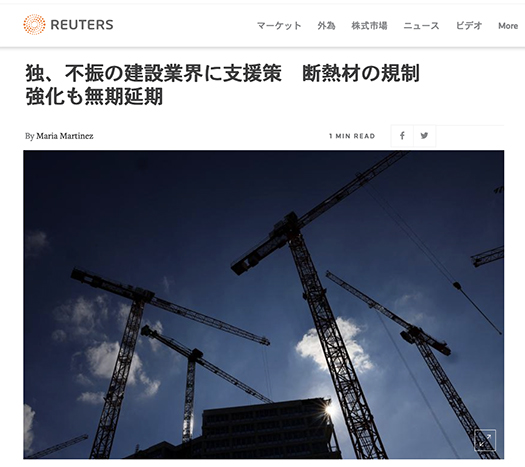
知人の北海道内住宅研究者の方からきのうの拙ブログ(元の過去記事はこちら)をチェックいただいたあと「不穏なニュース」としてこちらのニュース情報をいただいた。日本国内向けニュースではまったくスルーされていたのでわたしは気付かなかったのですが、たまたま昨日、ドイツと北海道の住宅施策対話についての過去ブログ記事のことを書いたので、最新動向として知らされた次第。
う〜む、でありますね。ドイツ経済はいまかなり困難な状況に陥っていると言われています。左派系政権が続いてきてSDGsとか、自然エネルギー最優先とかの政策を推進してきていたのですが、その実困ったときにはフランスから原発由来の電力を融通購入したりしていた。またユーロという共通通貨の恩恵で輸出競争力が不当に強くなっていたのも事実。さらにいえば中国との貿易関係で経済的利益を享受し続けてきていた。
そういった政策姿勢がロシアのウクライナ侵攻で、実はドイツは完全に炭素エネのロシア産の天然ガス依存のエネルギー政策だと曝露され、EU内、全世界的にその依存を極小化させる方向に転換せざるを得なかった。その結果、エネルギー価格が超高騰して生活にもまた産業全般にも負の爆発が起こってしまった。このままではドイツ国内で製造業を維持していくのは不可能として国外脱出の動きが産業側に出てきている。
これらはドイツの第3次世界敗戦と言われていたけれど、このニュースではその影響の深刻さがさらにえぐり出されてきている。引用すると以下。
〜[ベルリン 9/25 ロイター] -ドイツ政府は9/25、高金利とコスト高に苦しむ建設業界を支えるために450億ユーロ(約7兆2,000億円)の支援策を打ち出すとともに、予定していた断熱規制の強化を無期延期すると発表した。この決定により連邦政府は2027年までに手ごろな価格の住宅向け180億ユーロを支出する。残りは州や地方政府が拠出する。
コストがかかり過ぎるとして業界が反対していた断熱基準強化は無期延期した。断熱材や効率的な暖房システムを用いたビル改修を義務付ける欧州連合(EU)の法案に反対していく意向も示した。
ドイツの不動産業界は長年、低金利を支えにブームに沸いていたが、現在は急速な金利上昇のあおりで多くの開発業者が支払い不能状態に追い込まれている。ショルツ首相は記者会見で「住宅建設を大幅に拡大しなければならない。手ごろな価格の住宅がもっと必要だ」と述べた。〜以上(一部に説明的加筆)
ドイツの年間国家予算は5,727億ユーロ(91兆6千億円)なので、この住宅業界向け支援策は実に7.8%相当。こうした経済失政で現与党は最近の選挙では大敗続きとも言われている。
こういった状況のなかで過去のドイツの政治を見ると急激な振り子の振幅が見られてナチスが台頭したりした。ちょっと注意深く世界の動向を注視する必要がありそうですね。
English version⬇
The German economy is slowing sharply and the tightening of insulation standards “has been postponed indefinitely.
Hokkaido has historically learned from North America’s Scandinavian residential culture. Germany is said to be the third world economic loser. The Passive House-compliant insulation standard has been indefinitely postponed. …
After checking my blog yesterday, an acquaintance of mine, a housing researcher in Hokkaido, sent me this news item as “disturbing news”. I was unaware of this news because it had been completely ignored in the Japanese domestic news, but I happened to have written yesterday about a previous blog post about the dialogue between Germany and Hokkaido on housing policies, so I was informed of this latest development.
Well, I guess so. The German economy is said to be in a very difficult situation. The leftist government has been in power for a long time, promoting policies such as SDGs and prioritizing natural energy, but in times of trouble, the country has been purchasing electricity from France on a flexible basis from nuclear power plants. It is also true that the benefits of the common currency, the euro, have made the country’s exports unduly competitive. Furthermore, it has continued to enjoy economic benefits from its trade relations with China.
The invasion of Ukraine by Russia exposed Germany’s energy policy as completely dependent on Russian natural gas, which is a carbon-energy source, and Germany had no choice but to shift to minimize its dependence on this source both within the EU and worldwide. As a result, energy prices have skyrocketed, causing a negative explosion in both daily life and industry in general. As a result, the price of energy has skyrocketed, causing a negative explosion in both daily life and industry as a whole.
This has been called Germany’s third world defeat, but this news item further illustrates the severity of the effects. The following is a quote.
〜Berlin, Sept. 25 (Reuters) – The German government on Sept. 25 announced a 45 billion euro (¥7.2 trillion) aid package to support the construction industry, which is struggling with high interest rates and high costs, and indefinitely postponed a planned tightening of insulation regulations. With this decision, the federal government will spend 18 billion euros for affordable housing through 2027. The rest will be funded by state and local governments.
The strengthening of insulation standards, which the industry had opposed as too costly, has been postponed indefinitely. The government also expressed its intention to oppose European Union (EU) legislation that would require buildings to be renovated with insulation and efficient heating systems.
Germany’s real estate industry had been booming for years on the back of low interest rates, but now the rapid rise in interest rates is forcing many developers to become insolvent. At a press conference, Chancellor Scholz said, “We have to expand housing construction significantly. We need more affordable housing. ~More (some explanatory additions)
Germany’s annual national budget is 572.7 billion euros (¥91.6 trillion), so this support package for the housing industry is equivalent to 7.8% of the national budget. The current ruling party is said to have suffered a series of heavy defeats in recent elections due to such economic mismanagement.
In the midst of this situation, a look at past German politics reveals a sharp swing of the pendulum, which led to the rise of the Nazis. It seems that we need to watch the world trends a little more carefully.
Posted on 11月 8th, 2023 by 三木 奎吾
Filed under: 住宅マーケティング, 状況・政治への発言







コメントを投稿
「※誹謗中傷や、悪意のある書き込み、営利目的などのコメントを防ぐために、投稿された全てのコメントは一時的に保留されますのでご了承ください。」
You must be logged in to post a comment.